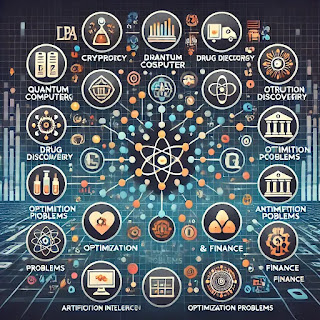Introduction In the rapidly evolving world of technology, quantum computing is emerging as one of the most groundbreaking advancements. Unlike classical computers, which use bits to process information, quantum computers leverage the power of quantum bits (qubits) to perform complex computations at speeds unimaginable with traditional systems. This article explores the fundamentals of quantum computing, its potential applications, and what the future holds for this revolutionary technology.
What is Quantum Computing? Quantum computing is based on the principles of quantum mechanics, a field of physics that describes the behavior of matter and energy at atomic and subatomic levels. The key elements of quantum computing include:
- Qubits: Unlike classical bits (which can be either 0 or 1), qubits can exist in a superposition of both states simultaneously.
- Superposition: This allows quantum computers to process multiple possibilities at once, exponentially increasing computational power.
- Entanglement: When qubits become entangled, the state of one qubit is instantly correlated with another, enabling faster and more efficient information transfer.
- Quantum Interference: This property helps optimize computations by reinforcing correct results and canceling out errors.
Applications of Quantum Computing Quantum computing has the potential to revolutionize various industries, including:
- Cryptography: Quantum computers could break current encryption methods, leading to the development of quantum-secure cryptographic systems.
- Drug Discovery: They can simulate molecular interactions at an unprecedented scale, accelerating pharmaceutical research.
- Optimization Problems: Industries like logistics and finance can benefit from quantum algorithms that solve complex optimization challenges.
- Artificial Intelligence: Quantum computing can enhance machine learning models, leading to faster and more accurate AI systems.
Challenges and Future of Quantum Computing Despite its immense potential, quantum computing faces several challenges:
- Error Rates: Quantum computations are highly susceptible to errors due to decoherence and noise.
- Scalability: Building large-scale quantum computers with stable qubits remains a significant hurdle.
- Cost: The technology is expensive and requires advanced infrastructure, such as cryogenic cooling systems.
However, researchers and tech giants like IBM, Google, and Microsoft are making significant strides in overcoming these obstacles. With ongoing advancements, quantum computers may soon transition from research labs to practical, real-world applications.
Conclusion Quantum computing represents the next frontier in computational power, with the potential to revolutionize industries and solve problems that were previously thought impossible. While still in its early stages, continuous research and development are paving the way for a quantum-powered future. As the field progresses, we may witness a transformation that will redefine how we process and analyze information.
Are you excited about the future of quantum computing? Share your thoughts in the comments below!
%20in%20a%20superposition%20state.%20The%20image%20features%20multiple%20glowing%20spheres%20representing%20qubits,%20each%20dis.webp)


Comments
Post a Comment